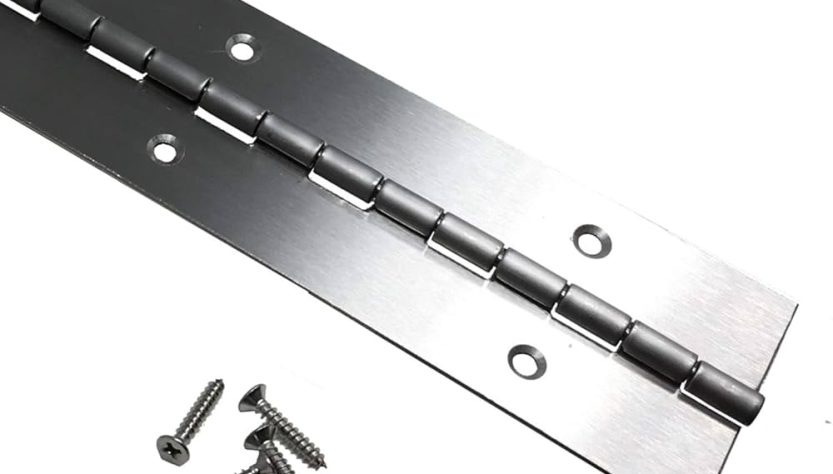When it comes to building reliable equipment, enclosures, or architectural structures, even the smallest mechanical components make a huge difference. The stainless steel piano hinge is one of those understated yet essential parts that ensure strength, precision, and long-term dependability. But not all piano hinges are created equal. Choosing the right type in the right size, material grade, and finish is key to achieving both functional and aesthetic goals.
For decades, Schutts Industrial has been at the forefront of designing and manufacturing top-quality stainless steel piano hinges, offering an extensive range of configurations to suit every application. Whether you’re building industrial machinery or fine cabinetry, Schutts Industrial provides the performance, customization, and expertise needed to get the job done right.
Why Stainless-Steel Piano Hinges?
Before diving into selection criteria, it’s important to understand what makes stainless steel piano hinges superior to other types of hinges. Unlike standard hinges that are installed at specific points, piano hinges also known as continuous hinges run the full length of the joining surfaces. This design distributes stress evenly, reducing wear and improving durability.
Stainless steel adds another layer of strength and resilience. It offers:
- Corrosion resistance in moisture-prone or chemical environments.
- High tensile strength for demanding industrial use.
- Minimal maintenance, even in harsh outdoor or marine conditions.
- A clean, professional appearance suitable for architectural and commercial applications.
Schutts Industrial enhances these natural benefits through precision engineering, ensuring that every hinge meets exact specifications and industry performance standards.
Step 1: Determine the Application Requirements
The first step in choosing the right hinge is understanding its purpose. Schutts Industrial offers custom hinge solutions for multiple industries each with its own demands:
- Industrial Equipment: Heavy-duty enclosures, guards, and doors require thicker leaves and robust pins to handle weight and frequent use.
- Marine and Outdoor Applications: Use 316 stainless steel hinges for maximum resistance to saltwater and humidity.
- Architectural Projects: Opt for polished or brushed finishes to complement interior designs.
- Medical and Food Processing: Choose hygienic-grade stainless steel for clean, smooth surfaces that meet sanitation standards.
By clearly defining the use case, you can narrow down the right hinge configuration.
Step 2: Choose the Right Stainless-Steel Grade
Not all stainless steels are alike. The two most commonly used for piano hinges are 304 and 316 grades both available through Schutts Industrial.
- Grade 304: Offers excellent corrosion resistance and strength, ideal for indoor and mild outdoor use.
- Grade 316: Contains added molybdenum, making it highly resistant to saltwater and chemicals the top choice for marine, medical, and food-grade applications.
Schutts Industrial’s engineering team helps clients identify the most suitable material for their environment and performance needs.
Step 3: Decide on Dimensions and Thickness
The length, width, and leaf thickness of the hinge directly affect its load capacity and fit. Schutts Industrial manufactures piano hinges in standard lengths as well as custom-cut options to match unique project requirements.
- Leaf Width: Determines surface coverage and stability.
- Thickness: Heavier-duty applications demand thicker leaves to prevent bending.
- Pin Diameter: Influences the hinge’s strength and movement smoothness.
Each hinge from Schutts Industrial is precision-machined to maintain consistent tolerances, ensuring a perfect fit every time.
Step 4: Consider Mounting and Hole Patterns
Mounting style is another key factor. Depending on the design, you may choose between:
- Drilled Hinges: Pre-drilled with countersunk holes for easy installation.
- Undrilled Hinges: Ideal for welding or when custom hole spacing is required.
- Surface-Mount or Concealed Options: For specific design preferences or functionality.
Schutts Industrial provides complete flexibility from hole placement to fastener compatibility ensuring effortless integration with your equipment or structure.
Step 5: Choose the Right Finish
Aesthetics and corrosion resistance often go hand in hand. Finishing options from Schutts Industrial include:
- Brushed Stainless Steel: Ideal for industrial or modern architectural applications.
- Polished Finish: Offers a high-end reflective surface, perfect for visible installations.
- Passivated or Electropolished Coatings: Enhance corrosion resistance and longevity.
These finishes not only enhance appearance but also improve performance by creating a protective layer on the metal’s surface.
Conclusion
Selecting the right stainless steel piano hinge isn’t a one-size-fits-all process. It requires a deep understanding of material properties, operational requirements, and installation details. With Schutts Industrial, customers gain access to decades of experience, advanced engineering support, and an unparalleled commitment to quality.
From design consultation to final production, Schutts Industrial ensures every hinge delivers the perfect blend of precision, performance, and practicality proving that even the smallest components can have the biggest impact on reliability and design integrity.

